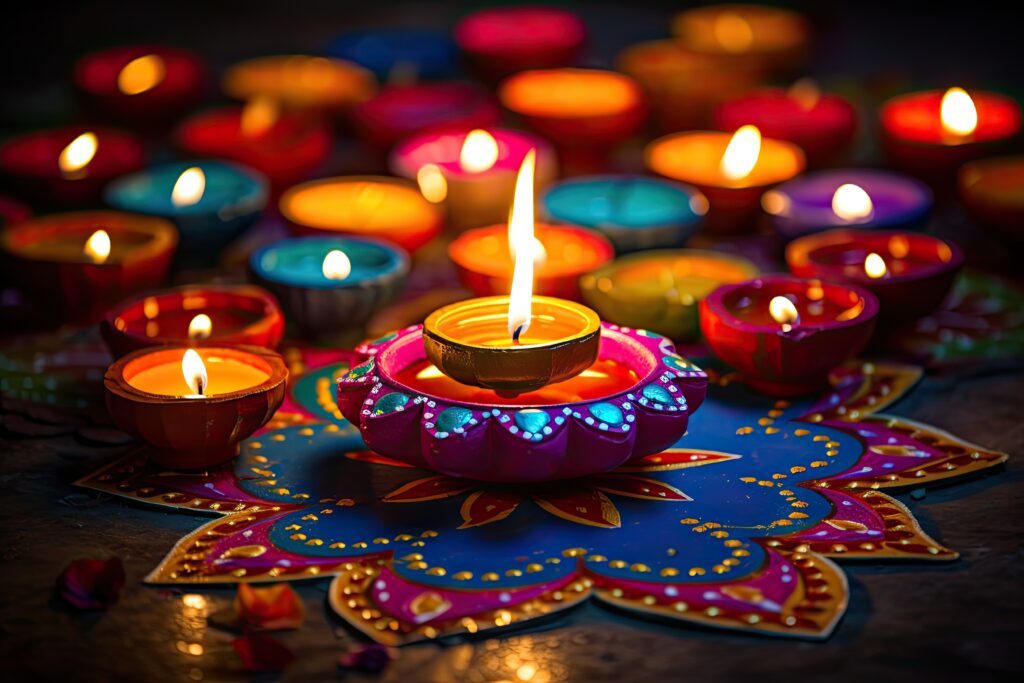Diwali: The Festival of Lights
Introduction
Diwali, known as Deepavali, is primarily honored by Hindus, Sikhs, Jains, and Buddhists. However, like Christmas, the holiday has transcended religion and is celebrated by many people outside these traditions.
The significance of the festival varies by town and location.
One of the narratives at the core of Diwali is derived from the Hindu epic, the Ramayana. During the exile of Prince Rama (an embodiment of the god Vishnu) and his wife Sita (an incarnation of the goddess Lakshmi), the demon king Ravana kidnaps Sita. Rama eventually defeats Ravana and saves his wife. For some Hindus, Diwali commemorates Rama and Sita’s triumphant return to their kingdom following 14 years of exile.
Diwali’s significance extends beyond a single narrative, encompassing various interpretations across different regions and religions in India. In the south, it marks Lord Krishna’s triumph over the demon Narakasura, symbolizing the liberation of thousands of captive women. Meanwhile, western India associates Diwali with Lord Vishnu’s banishment of the demon king Bali, signifying the triumph of good over evil. For Sikhs, Diwali is observed as “Bandi Chhor Divas,” commemorating the release of their sixth guru, Guru Hargobind, and 52 Hindu kings from unjust imprisonment. This act of defiance against the Mughal emperor Jahangir highlights the importance of justice and freedom. Despite the diverse interpretations, Diwali’s central theme of light overcoming darkness and celebrating freedom remains constant, unifying communities in a shared spirit of joy and hope.
How is Diwali Celebrated
Diwali Preparations
The anticipation of Diwali brings a wave of festive preparations that transform homes and communities. In the weeks leading up to the festival, a spirit of renewal takes hold as people engage in various traditions. Homes undergo a thorough cleaning and beautification process, often including fresh coats of paint and vibrant decorations. Shopping for new clothes and jewelry adds excitement, symbolizing a fresh start and prosperity. The exchange of gifts plays a significant role in fostering bonds within families and communities. Sweetmeats, dried fruits, and nuts are popular choices, representing sweetness and good fortune.

The festive spirit extends beyond homes, with communities buzzing with activity. Dinner parties have become common, offering opportunities to connect with loved ones and share in the season’s joy. Outdoor food festivals tantalize taste buds with diverse culinary delights, from savory kebabs and fried snacks to flavorful tandoori grills and spiced sweetmeats. Craft fairs showcase the talent of local artisans, offering unique and handcrafted items that make for cherished gifts or decorative pieces. This preparation period creates a vibrant atmosphere of anticipation and excitement, building up to the grand celebration of Diwali.
The Five Days of Diwali
The Diwali celebration unfolds over five days, each marked by unique traditions and rituals that weave a tapestry of cultural richness. The festivities begin two days before the main event, with the promising purchase of a metallic kitchen item symbolizing prosperity and good fortune. The eve of Diwali, known as “chotti Diwali” or “little Diwali,” is a flurry of activity. While traditionally dedicated to last-minute preparations, it has evolved into an occasion for exchanging gifts and completing errands. Homes come alive with vibrant “rangoli” designs and intricate patterns created on floors using colored powders and flower petals, adding a touch of artistic beauty to the festivities.
The third day marks the pinnacle of Diwali celebrations. As dusk settles, families gather to offer prayers, followed by the illumination of countless clay lamps around the house, symbolizing the triumph of light over darkness. While fireworks displays were once a prominent feature, noise, and air pollution concerns have led to a scaling back in recent years. However, the festive spirit remains undimmed, especially with the anticipation of a lavish feast shared with loved ones.
The day after Diwali sees regional variations in customs. In northern India, the morning is dedicated to honoring the tools of one’s trade, with chefs, business people, and artists expressing gratitude for the instruments that enable their livelihood. The final day of Diwali is a heartwarming celebration of sibling bonds. Sisters offer prayers for their brothers’ well-being and are showered with sweets and gifts in return, symbolizing love and appreciation. This five-day journey of rituals and festivities culminates in a renewed sense of hope, prosperity, and togetherness.
Festival Atmosphere – Experiences
A first-time Diwali attendee will step into a world bathed in the warm glow of countless diyas (oil lamps), transforming ordinary streets and homes into magical landscapes. The soft flickering of these lamps creates an atmosphere of peace and tranquility, inviting reflection and a sense of wonder. As dusk settles, the darkness recedes, replaced by a mesmerizing tapestry of light that symbolizes the triumph of good over evil, a core theme of Diwali.
Beyond the visual spectacle, the air is filled with a symphony of festive sounds. The joyous laughter of children, the rhythmic beats of traditional music, and the occasional crackle of fireworks create a vibrant soundscape that embodies the celebratory spirit of Diwali. The aroma of incense and delicious festive treats, such as laddoos, barfis, and savory snacks, wafts through the air, tempting the senses and adding to the sensory richness of the experience.
As you navigate the bustling streets and vibrant markets, you’ll encounter the intricate artistry of rangoli designs. These colorful patterns, meticulously crafted with colored powders and flower petals, adorn doorways and courtyards as decoration and a welcoming gesture. Witnessing families come together to create these intricate designs is a testament to the spirit of unity and creativity that Diwali fosters. The exchange of gifts, often sweets and other tokens of affection, further reinforces the bonds of love and friendship within families and communities.
The heart of Diwali lies in its spiritual significance. Observing or participating in puja ceremonies, where families offer prayers and seek blessings for prosperity and well-being, provides a glimpse into the deep-rooted religious traditions of India. Whether it’s witnessing the vibrant festivities or participating in the age-old customs, a first-time Diwali experience will leave a lasting impression, fostering a sense of awe and appreciation for the rich cultural tapestry of India.










